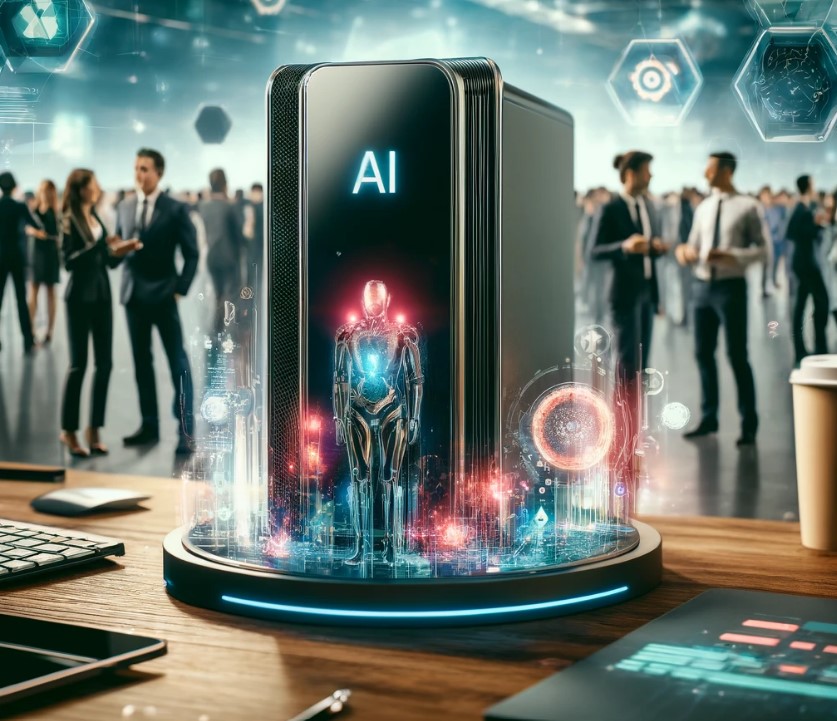THE RISE OF THE MACHINES…ON YOUR DESK
(INTC), (AMD), (QCOM), (NVDA)
I'm at my annual Silicon Valley poker night, trading barbs and bluffs with some of the biggest names in tech. The whiskey is flowing, the cigars are lit, and the pot is growing faster than a startup's user base.
Suddenly, the conversation takes a turn. One of the chip industry bigwigs, flush with a recent win, starts going on about how AI PCs are going to change the game.
Before I know it, the whole table is buzzing. CEOs are swapping stats, CTOs are arguing about architectures, and the VCs are practically salivating at the thought of the potential returns.
Being the grizzled veteran of the group, I lean back and take it all in. I've heard this kind of talk before - the next big thing, the revolution that's going to change everything. But something about this feels different.
As the night wears on and the stakes get higher, I can't shake the feeling that these AI PCs are more than just smoke and mirrors.
The numbers are just too damn compelling - a market set to soar from $225 billion in 2024 to over $270 billion by 2028, with a staggering compound annual growth rate of 44%.
It's the kind of growth that would make even the most seasoned investor's heart skip a beat.
But it's not just the money that's got me intrigued. It's the potential for these machines to fundamentally change the way we live and work.
Imagine a world where your computer is more than just a tool - a partner in crime that can help you solve problems, generate ideas, and even write that Great American Novel you've been putting off for years.
A world where the line between human and machine intelligence blurs, and the impossible becomes possible.
And the heavyweights of the chip world - Intel (INTC), Advanced Micro Devices (AMD), Qualcomm (QCOM), Nvidia (NVDA) - they're all in on the action, racing to stake their claim in this new frontier of computing.
They've been throwing around buzzwords like "revolutionary" and "game-changing" like they're going out of style, and they're backing it up with some serious muscle.
In fact, the personal computing devices market, which includes AI PCs, is predicted to see a rise in shipments reaching 398.6 million units in 2024, up 2.6% from the previous year.
That's a sign that the market is ready to embrace AI capabilities within personal and commercial computing spaces.
And let's not forget about the recent PC market recovery. A 3.2% year-on-year growth in PC shipments was reported in the first quarter of the year, after two years of weak sales following the work-from-home boom during the pandemic.
Needless to say, the stage is set for AI PCs to take the market by storm.
But perhaps the most exciting thing about the AI PC revolution is the way that it's going to reshape the global tech landscape.
In China, Lenovo (LNVGY) estimates that 54.7% of all new PCs sold in 2024 will be AI PCs, and that number is set to jump to a jaw-dropping 84.6% by 2027.
Clearly, this isn't just a US phenomenon - it's a global movement that's going to change the way we think about computing forever.
As the night winds down and the chips are cashed in, I can't help but feel a sense of excitement. The AI PC revolution might just be the real deal, and I'll be damned if I'm going to miss out on the action.
So the next day, I do what any self-respecting tech investor would do: I start making calls, cashing in favors, and doing my homework.
I'm not just looking for the next big win - I'm looking for the companies that are going to define the future.
Will it be Intel, with its decades of experience and unmatched expertise in the PC market? Will it be AMD, the scrappy underdog that's been nipping at Intel's heels for years?
Will it be Qualcomm, the mobile chip giant that's looking to make a splash in the PC world? Or will it be Nvidia, the graphics powerhouse that's been quietly building an AI empire behind the scenes?
Only time will tell, but one thing's for sure: the AI PC arms race is on, and I'm ready to saddle up and join the charge. Because if there's one thing I've learned in all my years in the Valley, it's that fortune favors the bold - and the well-informed.
So keep your eyes on the heavy hitters like Intel, AMD, Qualcomm, and Nvidia. They're the ones to watch in this AI PC revolution. And you can bet your bottom dollar that I'll be keeping my ear to the ground, ready to pounce on the next big thing.

